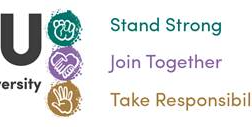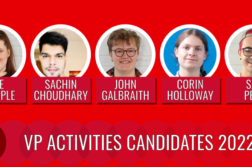Wessex Scene interview Martha Luke, who is running for the role of VP Education and Democracy in the 2021 SUSU Leadership Elections.
Why have you decided to run for the role of VP Education & Democracy?
I have decided to run for the role because this year I have recognised the number of issues which have come up both within my course and faculty, and in the wider university. There are so many new ways that students need support as a result of changes to teaching and learning (thanks a lot COVID-19), and I want to make sure that it is delivered to them in a helpful and timely way. Avila and her colleagues have been tackling some really important issues this year and I want to keep up the meaningful work she has been doing and continue to make positive changes.
What experience do you have that would make you an excellent fit for the role?
Though I have not spent as much time as perhaps other candidates have representing their peers, as I am only in my second year, I have still got plenty of relevant experience. At university, this has been raising issues with lecturers and faculties (even before I was a course rep), helping my course reps by attending liaison meetings in a supporting capacity to solve problems discussed by course-mates (I am joint honours which means I have course reps for the half of my course which I don’t represent myself), and naturally my work as a course rep which I absolutely love! Even at college I constantly communicated with our Principal to hold lecturers to account for their standard of teaching, writing numerous emails and holding meetings to make sure everyone felt supported by staff and could do their best. As a friend I always help people to understand their options and avenues for support when they are faced with problems at University – and if I don’t know how to fix it, I find out. I find great purpose and motivation in helping people, which is why I am an excellent fit for this role.
What are the main problems you identify with the current role of VP Education & Democracy and how would you fix that?
I think one of the main problems with the role of VP Education & Democracy currently is that successes are not celebrated, shortcomings are not explained and students don’t really know what aims and initiatives are being worked on at a given time. I would increase transparency; make sure the information about these points is readily available to students. I also think that Democracy doesn’t quite function in the way it should do for students. Union democracy should promote and engage with student projects and their aims much more; after all the Students’ Union is for the students! I think there is a substantial disconnect between students and SUSU at the moment, which I would absolutely work towards fixing. Though I recognise that one year will not be enough to solve the problems. Hopefully, I could set a path for VPs of Education and Democracy to come and be part of a larger project to rekindle a more intimate relationship between students and the Union.
The coronavirus pandemic has had a large impact on many students in many ways ranging from declining mental health to falling ill close to university deadlines. What will you do to ensure the fair and equal treatment of students who experience mitigating circumstances due to Covid-19?
Firstly, students need to be better informed on when and how to put in for special considerations (‘spec cons’) or extensions, and when their conditions are considered mitigating. I will advocate this as a key issue to faculties and encourage the promotion of this crucial information to students as part of their academic programmes. I will also lobby the University to communicate to faculties that they need to widen the criteria of the conditions which students must meet to be awarded spec cons or extensions to include a more diverse list of situations people may be in. This should include mental health and family situations. Self-certified applications for these allowances need to be promoted – especially by PATs, who will need to support more students in making self-certified applications. Improving the criteria for mitigating conditions now sets a precedent for the future; it should always have been easier to get spec cons, or an extension. Everyone should know how to do this from day 1 of their programme, without feeling worried or scared.
In the past couple of years, interest in the Union Elections has steadily declined, and this year, the voting arrangements have changed in order to account for this decline. What will you do to help improve engagement in student politics?
The main way I will achieve my aim to increase engagement in Union democracy is through publicity and marketing. Starting long before nomination deadlines, I will advertise upcoming elections on social media and in student communications etc. I will share key dates, celebrate elected representatives, and give regular updates about what elected teams and individuals are contributing to the community and educational experience at UoS. I will also promote the ‘You Make Change’ programme and its successes.
Many students have expressed concerns about a decline in education quality due to the coronavirus pandemic and the move to online learning. How do you propose to combat such issues?
In order for SUSU and students to monitor education quality closely, I will lobby the University to make regular assessments of online teaching standards and crucially I want them to publish their results. The University needs to be transparent.
I will couple this with continual student satisfaction checks by SUSU, which can be put to the University as evidence when changes must be made. Furthermore, I will fight for funding to enable the libraries to both provide faculties access to even more online resources (and make it easy for students to request access to new ones) and work on digitising their collection. This will increase resources available to students, which is key to completing their work to the best of their ability.
How will you support the academic interests of students who are typically sidelined, such as Joint Honours students, disabled students and postgrads?
I am a Joint Honours student myself and deal with a long-term health condition, so I am no stranger to having to search high and low to get information and support! One plan I have to support these students is to hold more regular forums, such as the recent PGR forum, and make sure that they are well-advertised to students. I think this will give opportunities for students who are typically sidelined to give specific feedback and receive my full attention so I can understand how best to support their academic interests. I will also ensure I work closely with the Joint Honours officer and PGR officers when looking at feedback from these forums and ways to action changes effectively and in the best interest of the students.
Furthermore, I will work with both the VP Welfare and Community and Enabling Services to make sure there are plenty of opportunities for disabled students to give feedback, find support and ask questions. For example, the Careers Service and Enabling Services currently work together to offer workshops about careers, finding work and knowing your employee rights in the world of work which are specific to students with disabilities and learning differences. This is the type of initiative I would like to expand on.
If you were elected, what would be your top three areas of focus?
- Dealing with the effects on students’ lives from COVID-19, both academically and pastorally. This means working with VP Welfare and Community to make sure mental health and wellbeing provisions are abundant and fit for purpose;
- Reviving engagement with Union democracy and optimising the way it runs. Increasing both number of candidates running and voter turnout along with making sure students have all the information they need to get involved in elections and other Representation initiatives;
- Making sure there are a lot of easy and approachable ways for students to ask questions, give their feedback and inform the work that our lovely Representation teams and myself will be doing. If elected, I will make sure everything I do is fully informed by students and elected representation; I love delivering positive outcomes and am so excited to work in this meaningful way for our UOS students!
In your manifesto, you state that you wish to improve the communication between SUSU, the University, and Students. How do you propose to do this?
Many of my aims and plans encourage increased communication with SUSU by nature as they promote and create ways for students to give feedback and ask questions. I think SUSU has a duty to continue giving regular updates about what they are doing for students – they have been doing this more often recently which I have been glad to see. Of course, what is communicated by students to SUSU is then sent forward to the University where applicable, but it is not often students receive updates straight from the Uni, e.g. the Vice Chancellor. In these unpredictable times, I think this kind of communication is especially important; for example I know that a recent email from Alex Neill as part of the ‘Ask UoS’ project was really useful to students and offered a lot of answers to our questions. I would like to work with Alex Neill to create more mini projects such as this.
How will you work to increase the number of voters in Union matters and ensure that Union Democracy is more accessible?
As explained in my answer to the fifth question, I plan to use social media and general marketing to increase awareness of upcoming opportunities to vote; raised awareness will help to increase voting turnout. Furthermore, I think celebrating and promoting success which has stemmed from student votes, the work of elected representatives and the ‘You Make Change’ programme will help students to see how important their participation in voting is! To make Union democracy more accessible I will focus on methods such as jargon-busting and creating explainer videos (such as the one SUSU uses to explain the voting system) to make sure students feel well-equipped to get involved.
I also want to make sure that SUSU promotes and supports student-led projects, such as Southampton Black Students’ Network, Once a Month (UoS student action group), UoS Women’s Physics network and many more- far too many to list here! University of Southampton students are AMAZING; they do great work for brilliant causes and have a lot of fight in them. I want to join forces with the student body and make sure they are voting for us to help them with their causes, not to create superficial causes and ask them to vote for what SUSU thinks they want. This way we will engage students in Union democracy, increase votes and therefore make change – SUSU and students will be synchronised, as they should be.



